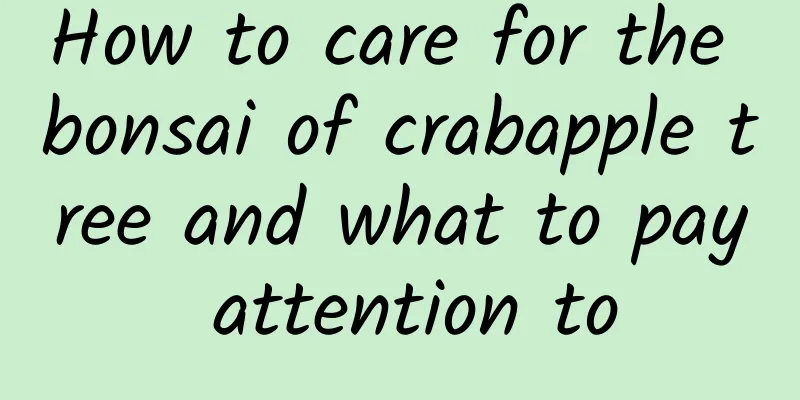How to care for the bonsai of crabapple tree and what to pay attention to

Feng Shui Meaning of Begonia BonsaiGenerally speaking, crabapple bonsai represents wealth and good fortune, because "Tang" and "Tang" are homophones, and the feng shui meaning of the crabapple tree in bloom generally symbolizes wealth and prosperity. How to care for the bonsai tree1. When caring for the crabapple bonsai, always place it in a sunny location. Pay attention to shade it in the summer to avoid direct sunlight to prevent yellowing leaves. Also, try to control its growth temperature between 10-20℃, which is suitable for its growth. 2. Pay attention to watering the crabapple bonsai tree on a regular basis. Remember to water it before its soil dries out. Also pay attention to reasonable fertilization. The plant needs to be fertilized in early spring, and appropriate topdressing should be applied after the leaves fall in autumn. Begonia bonsai pruningWhen pruning and shaping the crabapple bonsai tree, it is generally necessary to prune away the bad branches, first remove the dead branches and yellow branches, and then thin out the plant, mainly pruning away weak branches, dense branches, crossed branches, and overly long branches, to reduce nutrient consumption and increase aesthetics. Begonia bonsai yellow leavesThe yellowing leaves of the crabapple bonsai may be caused by improper watering. It needs to be watered properly. The plant must not be deprived of water, and there must be no water accumulation. It may also be due to iron deficiency. You can spray ferrous sulfate to supplement iron. If there is a lack of magnesium, you can apply some magnesium-containing fertilizers. Begonia bonsai tree falling leavesThe yellowing and falling leaves of the Begonia bonsai may be due to insufficient light, so it needs to be moved to a warm location with scattered light. It may also be due to water accumulation and root rot, so it is necessary to remove it from the pot, cut off the rotten roots, replace it with loose, slightly acidic flower soil, and move it to a ventilated place for slow maintenance. Fertilizing Crabapple Tree BonsaiIt is best to fertilize Begonia with compound fertilizers. You can use some special fertilizers at ordinary times. If the plant has not been fertilized for a long time, apply a thin liquid fertilizer or Cuimu compound fertilizer once a week or so. At the same time, you can also add some trace elements to the fertilizer appropriately. Begonia tree management considerationsThe crabapple bonsai will enter a dormant state in the summer. At this time, you don’t need to water it too much. You can use a watering can to spray water around the potting soil, but you cannot completely stop watering it. Except in the summer, you must fully meet its water needs during its growing period and replenish water normally. |
<<: The growth environment and characteristics of Polygonatum sibiricum
>>: How to care for Ulmus pumila bonsai and what to pay attention to
Recommend
How to save watermelon seeds
How to save watermelon seeds When watermelon matu...
How to grow Impatiens
1. Cultivation time The best time to cultivate Im...
How to grow sweet potatoes on the balcony
Home planting methods Sweet potatoes, called yam ...
How to determine whether pigs have blue ear disease?
Porcine reproductive and respiratory syndrome, al...
Precautions for pruning desert roses
1. Pruning tools When pruning desert roses, the m...
When is the best time to plant peppers?
To achieve high economic returns when growing pep...
How to water Michelia
What water to use It is best to use soft water wi...
Is hyacinth a shade-loving or sun-loving plant?
Does hyacinth prefer shade or sun? Hyacinth is a ...
How to care for roses during their flowering period
sunshine Roses need sufficient light during their...
Turning a wine bottle and a towel into a flower pot, it all depends on your imagination, you can’t deny it!
Electrical metal box turns into flower box You ca...
How to grow “white jasmine”? 10 common questions, you will learn them in one go!
1. Maintenance methods 1. Temperature: White jasm...
Can rice bran be used to grow flowers (can rice bran be cooked and fermented and put into a flower pot to grow flowers)
Rice bran is a byproduct of rice, wheat and other...
Can watermelon seedlings be transplanted?
Can watermelon seedlings be transplanted? Waterme...
How to grow potted orange trees in the north and how to grow them in winter
1. Potted plant maintenance methods 1. Water: In ...
Throw away the watermelon after eating it? Leave the skin on! Throw it into the pot, and the gardenia and jasmine... 30 flowers will bloom in a row!
Watermelon rind enzyme 1. Cut the watermelon rind...









